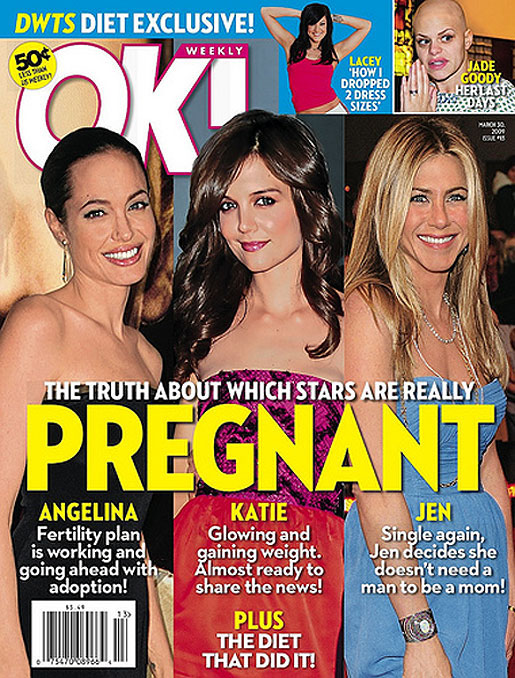
As if envying perfect hair, perfect bodies, and perfect multi-million dollar lifestyles wasn’t enough – now there’s another reason to envy Hollywood’s starlets – “easy” pregnancies after the age 40. A recent article in CNN, The ‘Big Lie’ in Putting Off Pregnancy, puts this very public and distorted image into perspective. Sure, Meryl Streep, Halle Barry, Uma Thurman and Nia Long (among others) have all given birth over the age of 40. In fact, Kelly Preston (wife of John Travolta) was 47 when she gave birth to their son Benjamin. However, this public idea/image that age doesn’t matter when it comes to getting pregnant is in direct opposition to the facts: Age matters!
Author Wendy Sachs states, “Forty may be the new 30, but our ovaries have not gotten the same makeover. Even with all the advances in reproductive technology, our eggs have a finite shelf life and the odds of having a child over 40 years old are shockingly slim.”
Is 40 the New 30 When it Comes to Reproduction? Sorry, Hollywood – But We Think Not!
Sachs points out that Hollywood has made late-pregnancy and motherhood as trendy as a typical fashion trend, never mind the fact it isn’t something that’s available to everyone. In fact, the hyper-aggrandized image of aging and motherhood in Hollywood is completely skewed. We see the examples of the couple dozen or so 40+ actresses, models, singers, etc. who have beat the odds, but we aren’t seeing the path it took to get them there, not to mention the financial costs, which most Americans can’t afford. Contrary to what we see in the magazines, natural pregnancy over 40 is possible, but it isn’t probable.
Here is the reality: by the time you reach age 40, your chances of naturally conceiving a baby dips to about 5%. By the time you reach age 45, that figure becomes close to zero at just 1%. Even In-vitro fertilization becomes trickier by the time you reach age 40 if you want use your own eggs. The eggs of a 40+ year old have the same issues in-vitro as they do in womb: higher levels of genetic abnormalities that lead to zero fertilization, non-viable embryo fertilization, or miscarriage after implant. This is one reason why we recommend women over the age of 40 consider the use of donor eggs in case their first cycle or two of IVF treatment using their own eggs is unsuccessful.
The Big Lie: Motherhood, Feminism and the Reality of the Biological Clock – A More Realistic Picture
Enter author Tanya Selvaratnam. She recently published a controversial book titled The Big Lie: Motherhood, Feminism and the Reality of the Biological Clock. Why controversial? Because many of us goal-setting, career-loving, world-traveling women haven’t wanted to face the reality of biology. Yes, society has become more open and accepting of women who want to conquer the world, but biology hasn’t made accommodations, regardless of what it looks like on magazine covers. Our bodies still prefer to get pregnant somewhere in our early 20s and are winding down the fertile process by the time we hit mid-30. This is a very different picture than what we may want to believe.
Selvaratnam writes from experience. She was a member of the growing group of women, confident that putting off having their children won’t cause a problem for them. She had her first miscarriage at age 37. From the standpoint of a center specializing in reproductive technology, we would have urged Ms. Selvaratnam to see a specialist immediately. Instead, her well-meaning doctor told her she “still had time”, preventing her from getting the immediate reproductive assistance and support she needed.
We agree with Ms. Selvartnam, “When women have miscarriages or infertility we feel like failures. I want people to realize how common these issues are. When you see the statistics, it becomes clear you are not alone.” Her hope is that the publication of her book will help to unveil the subjects of fertility and infertility from the realm of secrecy, advocate for health insurance companies to provide better coverage for fertility treatments, and transform the culture around women, work, and flexibility to have children.
(Photo: misspennydreadful.blogspot.com)
 Patient Portal
Patient Portal
